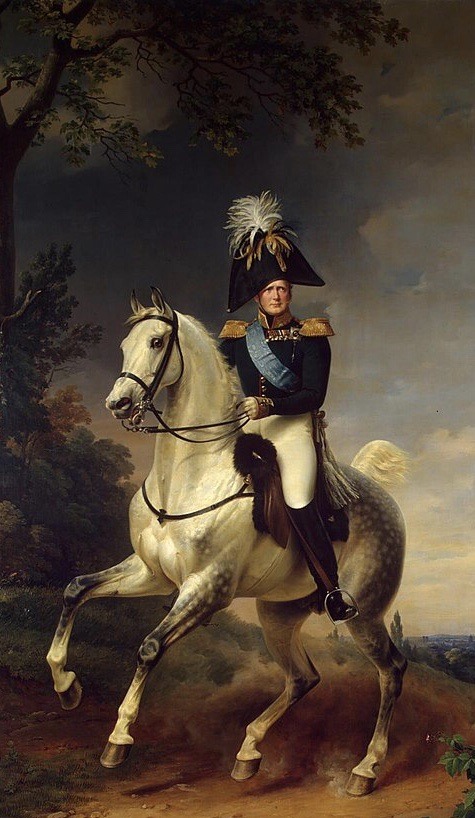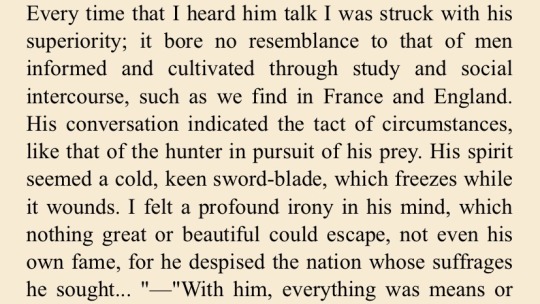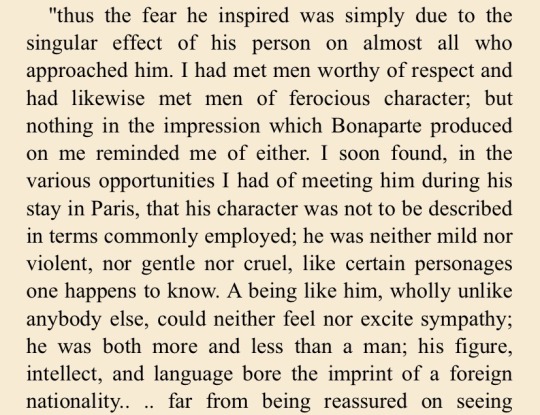#Madame Germaine de Staël
Text
“I finally saw this monarch, absolute by law and by custom and yet so moderate by inclination. What first struck me about him was an expression of goodness and dignity such that the two qualities appeared inseparable and seemed to be a single one. I was also touched by the noble simplicity with which he tackled the great interests of Europe, from the first phrases that he addressed to me. […] Alexander gives and withdraws his trust with great reflection. His youth and his exterior advantages alone, at the beginning of his reign, could have made people suspicious of his lack of thought but he is serious as only a man who has known misfortune can be.”
- Madame de Staël on Alexander I, 1812

#I can’t believe I picked up another book about him goddamnit#also describe alexander without mentioning his ‘exterior advantages’ challange#alexander i#alexander i of russia#madame de staël#germaine de staël-holstein#napoleonic wars#quotes
51 notes
·
View notes
Text
A religious life is a struggle and not a hymn.
— Anne Louise Germaine de Staël
#life quotes#lifequotes#light#quote#quote of the day#quoteoftheday#quotes#wisdom#Anne Louise Germaine de Staël#Madame de Staël#religion#religious life#challenges#overcoming challenges#life challenges#endurance#persistence#tests#tests of faith#tests of strength#tests of will#test of strength#test of faith#test of will#struggles#hymns#maturity#humanity#human nature
25 notes
·
View notes
Text
Napoleon’s relationship and Madame de Staël
“It was certainly not a product of the groundless claim that Napoleon disliked ‘intellectual women’, a jibe repeated even by so powerful a mind as that of Pieter Geyl. His close relationship with his step-daughter, Hortense, his singular efforts in the realm of girls’ education, and the power he gave two of his sisters — Elisa, in Tuscany, and Caroline, in Naples — readily belie this. Napoleon viewed Staël in no small part with the eye of Figaro: She was a spoiled product of ancien régime privilege, the daughter of a powerful minister and financier, the wife of an aged aristocrat she played for a fool; she was just a ponce, however clever. To Napoleon, she was patronising the parvenu. As with Figaro, confrontation with such a creature could cloud the mind, but this was the exception to the rule.”
— Michael Broers, Napoleon: Soldier of Destiny
#Michael Broers#Broers#Napoleon: Soldier of Destiny#napoleon#napoleonic era#napoleonic#napoleon bonaparte#first french empire#french empire#madame de staël#de staël#germaine de staël#Napoleon and women
25 notes
·
View notes
Text

From left to right: Marie-Anne Pierrette Paulze, Élisabeth Vigée Le Brun, Germaine de Staël, Madame Marie-Jeanne 'Manon' Roland de la Platière, Marie-Anne Charlotte de Corday d'Armont, Olympe de Gouges
In 2022 opera on the women of the French revolution premiered! It is called GIRONDINES! It's an English language opera that premiered with Wilmington Concert Opera and will be having its West Coast premier with Mission Opera!

Album image for the original concert cast album
According to an February 2023 article by Broadway World: "The Original Wilmington Concert Opera Cast Album is now available! It features Kirsten C. Kunkle as Charlotte Corday, Ashley Becker as Olympe de Gouges, Marisa Robinson as Marie Anne Pierrette Paulze Lavoisier, Alyssa Maria Lehman as Manon Roland, Raffaella Lo Castro as Germaine de Staël, Tracy Sturgis as Élisabeth Louise Vigée Le Brun, Thuy Nguyen on Violin, Melissa Brun on Cello, and Sarah Van Sciver on Piano."
I have not yet listened but as someone into frev and opera I am very excited. It also looks like the original concert production may be available to watch on YouTube!

Promo image for the October production
So far it looks like these have been small scale productions, but everything starts somewhere! I need to listen to the music but I wish good things to come
#opera#frev#french revolution#history#Marie-Anne Pierrette Paulze#Countess vom Rumford#Élisabeth Vigée Le Brun#Le Brun#Germaine de Staël#Madame de Staël#de Staël#Marie-Jeanne 'Manon' Roland de la Platière#Madame Roland#Marie-Anne Charlotte de Corday d'Armont#Charlotte Corday#Olympe de Gouges#womens history#herstory#new opera#new theatre#theatre#undescribed#please if anyone has the ability to add image ids for this id appreciate it
10 notes
·
View notes
Text

Corinne at Cape Misenum by François Gérard
Showing the title character from Corinne, an 1808 novel by Madame de Stael, at Cape Miseno.
#corinne#cape misenum#françois gérard#art#madame de stael#madame de staël#europe#european#cape miseno#napoleonic#germaine de staël#history#painting#france#french#gulf of naples#campania#southern italy#italy#vesuvius#mount vesuvius#landscape
18 notes
·
View notes
Note
Germaine de Staël propaganda!! it was said at the time that there were three great powers struggling against Napoleon for Europe: Britain, Russia and Madame de Staël. nothing more sexy than being as politically influential as an entire country on your own
.
14 notes
·
View notes
Text










arabella + still being in love with seven
sevenbella series: [1/?]
jeanette winterson, written on the body / amyreads, infamous / lidia yuknavitch, the chronology of water: a memoir / leah horlick, for your own good / germaine de staël, madame de staël selected correspondence / lorde, writer in the dark / sue zhao, tumblr / edna st. vincent millay, letters / tristan, keep that to yourself / rebecca makkai, the great believers
#infamous#infamous if#seven lawless x mc#web weaving#inf: seven x arabella#inf: arabella#yea . i cannot stop thinking abt them LMFAOSJJSNSBDNSMS#main tagging feels a bit weird but i think most infamous mc's can relate to this ?? hopefully anyway . idk KSJSJDBDBDSN#anyway#I STILL LOVED YOU I STILL HAVE TO LIVE WITH THAT !!!!!!!!!!!!!!!!#also this might become a series . who fucken knows but if the brain rot continues being this severe then !
71 notes
·
View notes
Text
Help for information about of Germaine Stael
Good evening, everyone. Today, once again, I'm asking for your help regarding a historical figure about whom I don't have much knowledge: Germaine de Stael.
She's often described as one of the principal and most important opponent of Napoleon ( a lot in the media), but I get the impression that she was primarily a « salon opponent », if you'll pardon the expression (especially when compared to figures like Prieur de la Marne, Sanité Belair, Jean-Baptiste-Antoine Lefranc, and what they endured or suffered under repression). Perhaps my biases stem from her father, who adopted a false friend of the people stance that Marat rightfully denounced.
The problem is that my only source is Jean Tulard, who is a historian known to be partial to Napoleon (he claims that Madame de Staël offered her services to the Emperor in exchange for two million francs). It’s not a problem to be partisan, I always think that objectivity in history can’t exist, you can only try to be objective, but I wish more views of other historians. Frankly, I don't know much (if anything—I was more focused on the banker and former finance minister Necker than her ), so I invite anyone knowledgeable on the subject to help me on Madame de Staël and to point me towards good sources about her
5 notes
·
View notes
Photo

Anne Louise Germaine de Staël-Holstein (née Necker; 22 April 1766 – 14 July 1817), commonly known as Madame de Staël, was a French woman of letters and political theorist, the daughter of banker and French finance minister Jacques Necker and Suzanne Curchod, a leading salonnière. She was a voice of moderation in the French Revolution and the Napoleonic era up to the French Restoration. She was present at the Estates General of 1789 and at the 1789 Declaration of the Rights of Man and of the Citizen. Her intellectual collaboration with Benjamin Constant between 1794 and 1810 made them one of the most celebrated intellectual couples of their time. She discovered sooner than others the tyrannical character and designs of Napoleon. For many years she lived as an exile – firstly during the Reign of Terror and later due to personal persecution by Napoleon.
In exile, she became the centre of the Coppet group with her unrivalled network of contacts across Europe. In 1814 one of her contemporaries observed that "there are three great powers struggling against Napoleon for the soul of Europe: England, Russia, and Madame de Staël". Known as a witty and brilliant conversationalist, and often dressed in daring outfits, she stimulated the political and intellectual life of her times. Her works, whether novels, travel literature or polemics, which emphasised individuality and passion, made a lasting mark on European thought. De Staël spread the notion of Romanticism widely by its repeated use.
#Germaine de Staël#women in history#women in politics#XVIII century#XIX century#people#portrait#paintings#art#arte
5 notes
·
View notes
Text
Random translation related trivia/anecdote cause why not.
In 1816, french baroness and intellectual Anne-Louise-Germaine Necker, more commonly known as Madame de Staël, published an article in la biblioteca italiana (a famous newspaper basically) which can loosely be summed up as "well yes, classics are in fact not bad, but the silly obsessions you italians have with them borders the odd, because you are "stuck" in old habits and knowledge. You guys should ramp up your translation industry so you can also get to read the poetry and the theatre and fellow "literary pillars" of other countries, not to be assimilated by foreign cultures, but to learn new things thanks to them.
And I do think this is pretty cool.
3 notes
·
View notes
Text
"Reason does not give happiness in place of that which it takes away."
Madame Germaine de Staël, French Woman of Letters,
as quoted in The Story of Civilization #11
The Age of Napoleon
by Will Durant, Ariel Durant
#reason#civiliation#french revolution#rationality#magic#religion#spirit#spirituality#irrationality#human nature#psychology#technology#science#scientism#philosophy#irrational man#quotes#napoleon#will and ariel durant#the story of civilzation#book quotes#reading#amreading#french#Madame Germaine de Staël#Madame de Staël#Germaine de Staël
5 notes
·
View notes
Text
Empress. Weiser Waite Smith Tarot

A woman, often depicted as pregnant, sits in a lush garden.
The Empress is the combination of Venus—the lover—and the Moon—the mother. She is a sensual yet nurturing force. Her pregnancy signals her fertility and her potential for creation. The Empress represents the emotional world, the sensual world, and the possibility of new life. She is given the number three.
The Empress represents creative fertility; a tremendous potential to take an idea and turn it into a finished product. When we use motherhood metaphors to explain the creative process—nurturing an idea, pregnant with the project, birthing a book, that sort of thing—we’re dealing with the Empress.
Do you know those wonderful polymaths who always seem to be doing one thing and then another? Someone like Madame Anne-Louise-Germaine de Staël, who in the late seventeen hundreds and early eighteen hundreds hosted a literary salon and hung out with the great minds of her generation, wrote novels and essays and works of philosophy, opposed Emperor Napoléon I of France politically, and so on. Or around the same time, in Germany, Johann Wolfgang von Goethe, who studied botany, wrote plays, poetry, and novels, and served as a diplomat—along with drawing and producing scientific papers on the side. Such multitalented individuals don’t do all of this strictly to make us feel inadequate, but because they are bursting with energy and know what to do with it.
The Empress is well centered. She is in many ways a combination of the two cards before her, the Magician and the High Priestess. She is balanced between intake and output, and she knows how to foster her imagination, as well as how to really get to work. In contrast with the Emperor, who follows, it’s less about creating a legacy than it is about personal expression. She’s very emotional, going back to her roots as a mother figure or a pregnant woman. So it’s about an emotional, personal attachment to the work you’re producing, rather than, “Well, if I want that building named after me when I’m dead, I had better finish writing this eight-volume history of the Counter-Reformation.”
The tricky thing with the Empress is that, when stressed or upside down, she can be all potential. As in, it can be a little easy to get stuck in the pregnancy part and forget to actually give birth. And if she’s too easily distracted, she can be overwhelmed with one idea after another, without giving enough time or focus to see any of them to completion.
But when you feel like you can’t get anything done and the Empress shows up, she’s hinting that maybe you should try to take on more rather than focus on a smaller number of projects. The Empress is nothing if not fecund—she doesn’t have only a rose garden but also tulips and fruit-bearing trees and a vegetable garden and some herbs and on and on. You might have hidden talents, you might have a capacity that is so much larger than you ever would have expected, and the only way you’ll ever know is if you try.
RECOMMENDED MATERIALS
Venetian Epigrams, book by Johann Wolfgang von Goethe
“Feeling Good,” recording by Nina Simone
Silueta series, photography by Ana Mendieta
Jessa Crispin
0 notes
Text
The evil arising from mental improvement can be corrected only by a still further progress in that very improvement. Either morality is a fable, or the more enlightened we are, the more attached to it we become.
— Anne Louise Germaine de Staël
#life quotes#lifequotes#light#quote#quote of the day#quoteoftheday#quotes#wisdom#Anne Louise Germaine de Staël#Madame de Staël#progress#improvement#self development#self improvement#evil#good#goodness#good vs evil#mental improvement#mind#intellect#conceptual thought#outgrowing intellect#the limits of thoughts#morality#truth#order#maturity#human nature#humanity
2 notes
·
View notes
Text
Madame de Staël:


Source: The Origins of Contemporary France, Volume 5
#madame de staël#Germaine de Staël#quote#napoleonic era#napoleonic#19th century#anti-Napoleon propaganda#first french empire#french empire#napoleon#napoleon bonaparte#taine#Hippolyte taine#history#france#1800s#historian#Gutenberg
17 notes
·
View notes
Text
Visitez le Château de Coppet
Between Nyon and Geneva, off the National Road, lies the “Visit the Coppet Castle” which billboard has not changed in more than 30 years. It is a discreet sign for a place that was once a Bastion for Opposition to Napoleon Bonaparte at the turn of the Nineteenth Century. At that time the lady of the Castle was none other than Madame Germaine de Staël, the most influential Woman of the turn of the…

View On WordPress
0 notes
Photo

HUFFLEPUFF: "The voice of conscience is so delicate that it is easy to stifle; but it is also so clear that it is impossible to mistake." –Germaine de Staël (De l'Allemagne)
#harry potter#house quotes#hufflepuff#germaine de stael#germaine de staël#madame de stael#de l'allemagne#of germany#hphq
170 notes
·
View notes